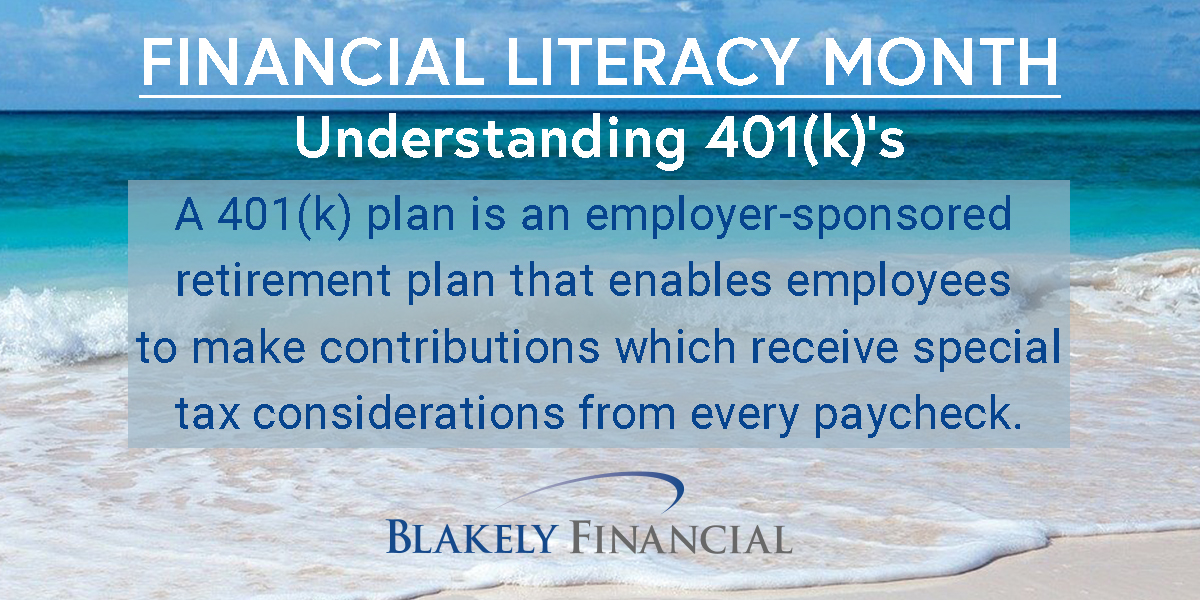Presented by EMILY PROMISE AIF®, APMA®, CRPC®
A 401(k) plan is a company-sponsored retirement plan that eligible employees can contribute a portion of their salary into a variety of investment options. In some instances, employers may also offer to make matching contributions. 401(k) plans are an easy way to save for the future through payroll contributions.
If your company offers a 401(k) plan and you are not participating, you may want to revisit your decision as they are a great opportunity to save for retirement. Beginning early and consistently contributing to a 401(k) plan throughout your working years can assist you in reaching your financial goals for retirement.
If you have just entered the workforce, retirement may be the farthest thing from your mind. Or if you are an older employee nearing retirement, you might be thinking it is too late. For both life stages, 401(k)s can offer specific advantages that make them a great option for investing and saving.
401(k) contributions are typically ‘before tax’ money. The amount you choose to contribute is deducted from your paycheck before taxes are taken out. This means you are paying taxes on a smaller portion of your salary. There are limits each year on just how much you can put in your 401(k). In 2020, the maximum amount one can contribute is $19,500. If you are 50 or older, you can make a catch-up contribution of $6,500 in addition to the $19,500 for a total of $26,000.
Many plans also offer options for employees to make post-tax ROTH 401(k) contributions from their paychecks. Post-tax ROTH contributions do not lower an employee’s taxable income, but they do grow tax free and aren’t taxed upon withdrawal.
Many employers offer matching contributions. For example, your employer may offer a 4 percent match. This means they will contribute the same amount that you do, up to 4 percent. Of course, you can personally contribute more, but the company will match only 4 percent. If you are not contributing to your company’s 401(k) plan and they have a match, you are leaving money on the table! Make sure to begin contributing at least to the amount of the match as soon as you can.
An additional benefit of a 401(k) plan is that when you finally pay the taxes on your 401(k) contributions, you may be at a lower rate. Typically, you begin withdrawing money from your 401(k) when you retire and you may very well be in a lower tax bracket at that time; thus you could end up paying less tax on your savings when you do eventually withdraw funds.
A few key points to remember about a 401(k); It is a retirement savings plan, so once you put money in, it is always best to leave it in. There are penalties if you take the money out before retirement age. Also keep in mind that if you change employers, you can roll your vested balance into your new employer’s 401(k) plan or into another qualifying retirement account such as an IRA.
If you have questions, it is always a great idea to call your financial advisor for guidance. But no matter what, please take advantage of any type of savings plan your current employer offers as the earlier and more aggressive you are, the closer you will come to achieving your financial goals.
Engage with the entire Blakely Financial team at WWW.BLAKELYFINANCIAL.COM to see what other expert advice we can provide towards your financial well-being.
EMILY PROMISE is a financial advisor with BLAKELY FINANCIAL, INC. located at 1022 Hutton Ln., Suite 109, High Point, NC 27262 and can be reached at (336) 885-2530.
Blakely Financial, Inc. is an independent financial planning and investment management firm that provides clarity, insight, and guidance to help our clients attain their financial goals.
Securities and advisory services offered through Commonwealth Financial Network, Member FINRA/SIPC, a Registered Investment Adviser

